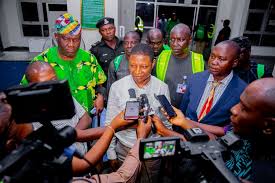The federal government has restated its commitment to the care and support for women, girls and persons with disabilities (PWDs) across the country.
Speaking in Abuja, Tuesday, during a one-day meeting for development of strategies for care and support of PWDs in Nigeria, the Permanent Secretary of the Ministry of Humanitarian Affairs, Disaster Management and Social Development, Alhaji Bashir Alkali, said there were still significant gaps in operationalising the mainstreaming of gender and disabilities at field levels “as capacities of women and girls with disabilities were often under-presented.”
He said: “Women and girls with disabilities have attitudinal barriers from community members, their families and service providers alike, as well as environmental and communication barriers. These barriers have not only reduced their voices and participation in programmes planning, but also their access to essential services, including sexual and reproductive health and gender-based violence.
“No single actor or stakeholder working alone can implement the Discrimination Against Persons with Disabilities Prohibition Act of 2018 effectively. Thus, the Minister, Hajiya Sadiya Umar Farouq, inaugurated the Coalition of NGOs for the care and support of women and girls with disabilities in order to promote and advance their rights and we are 100 per cent committed to that.”
Also speaking, the Executive Secretary of Commission for Persons Living with Disabilities, Mr James Lalu, said issues of women with disabilities was a priority for the Commission, adding that he is aware that Farouq is doing a lot to ensure that the Commission has a huge budget next year “in order to help take care of a lot of programmes for PWDs in the country.”
“We have about five lawyers who are always ready to take up any issue concerning persons with disabilities in the country. Also, our engineers have done assessment work in University of Sokoto, ABU Zaria and others on disability friendly structures in the institutions. A lot of good things are coming to us soon,” he said.




